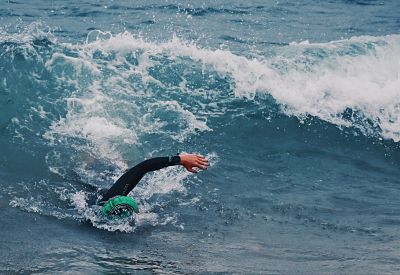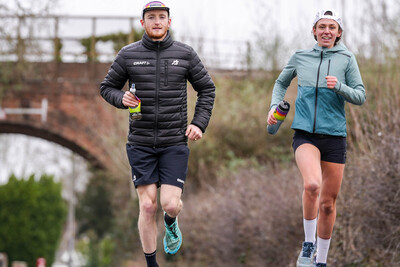Most professional endurance athletes, be it runners, swimmers or triathletes, will receive external guidance when it comes to their training. They’ll get input from a coach, a mentor or from an extended support team, which may well include a nutritionist, psychologist or strength expert.
But, as an amateur athlete, do you need a coach?
If you participate in any sport, it’s only natural that you want to do your best. That usually means training to improve and testing yourself with races or challenges. There are three ways you could approach training towards a goal race or challenge: self-coach, download a training plan, or hire a coach.
Let’s look at these options…
Self-coached vs Training Guide vs Coach
1. Self-coached
Often, we think we can do it alone, especially as hiring a coach involves an extra financial outlay. But from my experience, your training and performance goes one of two ways when self-coaching – you either over cook it, or you underdo it.
Speaking from experience as an amateur triathlete after graduating from the University of Bath, I left behind a coach and a training group at the high-performance triathlon centre where I had been for four years. I opted to self-coach myself for a few years, mainly due to lack of finances and perhaps a bit of arrogance.

When it comes to self-coaching, I’ve been there, done that, performed well but over cooked it.
I did have great racing success, including being crowned the World 70.3 Champion at 25 years old, as fastest amateur female overall, but I also had some terrible habits, including high volume, little recovery time, zero conditioning and weird nutritional strategies.
After winning the Worlds and a few other age group titles, people around encouraged me to get some guidance and so I did get a coach to help me work on my weaknesses (more on that later).
2. Generic training plan
Generic training plans off the internet or from a book are great for ease of access and are kinder on the bank balance, but there’s no personal touch.
When you download a training plan or take one from a book, the author doesn’t know who you are and they don't know if the plan is really right for you. These plans are typically outlined by ability, so you will have to place yourself in a category: beginner, intermediate, advanced, or elite.
You’ll receive a calendar of workouts weekly, biweekly or monthly and you'll probably follow it religiously. If injury, illness, lack of sleep, poor nutrition, fatigue, mood-swings or anything else affects you, the determined athlete will often carry on regardless and figure out how to get all of the sessions in, any way they can. Cue overtraining.
3. Hire a coach
Taking the leap to hiring a coach should be a process. Typically, you would ask for recommendations from other athletes you admire and perhaps even interview a few different coaches to see which one feels best.
The first noticeable difference to consider when you work with a coach is the greater degree of communication. A coach will wish to keep in touch regularly on everything related to your plan, how you're feeling and how set sessions went. A coach will create a customised plan to help you progress and they will take time to get to know your strengths and weaknesses, often adapting the weekly training plan depending on your ever-changing situation.
A coach can either be someone you work with virtually or someone in your local area, and they should always be your biggest advocate. This is certainly one of the best things about having a coach. They're with you through the good, the bad and the ugly in training and racing – saving your family and friends from having to listen to all of your sports-related woes!
Coaches always celebrate you - when they see a workout successfully completed and when you achieve your goals. And a coach is there to do the work - they measure and evaluate your progress and they keep your big goals in mind.
Often coaches see what the athlete can’t. This can be challenging for the driven athlete, but a coach will notice fatigue, recommend extra rest and know when to push an athlete more.
Do you need a coach?
Here are five reasons why you might want to consider working with a coach…
1. Holds you accountable
This is perhaps the most important reason to consider having a coach. A coach will schedule all your training on a weekly basis, instantly removing the guesswork. Suddenly you become more accountable to completing sessions.
Most of us have limiting beliefs and patterns that hold us back, preventing us from completing certain sessions or avoiding them altogether – this could be anything from strength and conditioning to a hard swim or bike session. When you have a coach who’s there to push you beyond your limits, a breakthrough occurs.

2. Helps you reach your goals faster and saves you time
A coach will work with you to set attainable goals that are challenging and satisfying at the same time. Coaches also know about ideal races and events that can help you reach your goals, saving you the time and energy in deciding upon an event.
3. Receive feedback
Unbiased feedback and advice can be hard to come by and a coach can see which areas need work and focus.
4. Provides confidence
We are often our own worst critics and a coach, one-step removed, can see improvements that athletes often dismiss.
5. Maintains perspective and positivity
Having a coach keeps us positive and moving forward, even if training or a race didn't go as well as hoped. Every situation has meaning but this is very difficult to see when we’re living it, in the moment. A coach can help to filter out the noise and bring the highlights to an athlete’s attention.
How do you find the right coach for you?
Do your research. If you have a friend who’s coached, ask them about the pros and cons. Contact a few coaches and ask them some questions to get to know their style. Ask yourself, are you ready to be coached and work with someone else?
Be patient, trust and teamwork takes time so give yourself a few months to settle into the new routine.
Still not sure if a coach is right for you? Let me leave you with an insight into how a coach helped me improve my weak points during my own triathlon career.
Firstly, I swam less and harder. Over 18 months, I took four minutes off my 1,500m time! This made me into one of the fastest swimmers in pro racing and helped me win the Oceanman 5km World Championships.
I started to bike with a power meter and did regular testing in a lab, with a bike fit. This improved my TT riding over IRONMAN distance and, although my running slowed (it was previously my strength), my overall strength and long-term health improved as I was eating better, getting more rest and actually recovering properly.
